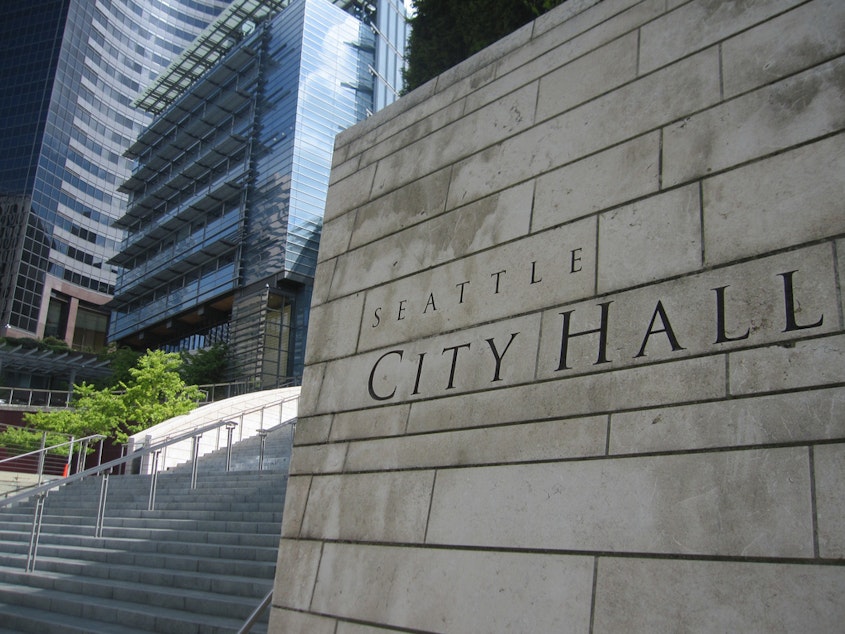Awkward Seattle election endorsements: Today So Far

- Not every Seattle council member is endorsing the same candidates.
- Game on! Seattle ends its longstanding fee on amusement.
- Seattle's celebrity tree is saved from the axe.
This post originally appeared in KUOW's Today So Far newsletter for Aug. 10, 2023.
Quick hits
- Seattle becomes first in U.S. to protect gig workers from sudden "deactivation"
- Seattle lays out plan to uphold treaties and consider Indigenous concerns
- A guided tour of Seattle's new waterfront
We're just a week past the primary election and Seattle is getting some campaign drama started. Council President Debora Juarez just endorsed Bob Kettle, who is challenging her council colleague, incumbent Andrew Lewis — awkward.
Juarez is actually just the latest council member to endorse a candidate in District 7. Councilmember Sara Nelson also endorsed Kettle. Councilmember Lisa Herbold endorsed Lewis, as did Councilmember Teresa Mosqueda. So that's a pretty even endorsement split for each candidate. Once again, Seattle is dealing with a blue versus blue dilemma. All these candidates and politicians swim in the same end of the political pool, but there is a gap. Basically, one corner of Seattle says, "I'm blue." But another corner is quick to counter, "Nuh-uh, I'm more blue than you. You're more like periwinkle."
"Nah, I'm more like a blueberry."
"Well, I'm as blue as Bette Davis' eyes."
"Back off, I'm as blue as Blue's Clues!"
"Pssh, whatever, I'm as blue as when Beach House sings about lapis lazuli."
"You're not fooling me. I'm blue! Da ba dee da ba di..."
And that's basically the debate in Seattle. Read more here.
In other Andrew Lewis news, the council member recently got unanimous approval from the council to eliminate Seattle's amusement fee. Yep, the city had a fee on amusement, specifically devices and machines that bring people joy, like pinball machines, arcade games, pool tables, shuffleboards, etc. There's a long history behind this, but in a modern light, it was placing a hefty cost on operators and business owners, while not really bringing in too much money for the city.
That got Lewis thinking, as the city seeks ways to recover from pandemic slowdowns. Knocking down this fee is one method aimed at doing that — no more fee, encourage more fun, bring in more people. Read more here.
Seattle's celebrity tree has been saved from the axe.
The Wedgwood tree that activists named "Luma," prompted significant response from locals last month, who rallied to prevent builders from cutting the tree down. Now, the developers of this property, and the Snoqualmie Tribe, have found a path forward that keeps the double trunk western redcedar in place. Read more here.
AS SEEN ON KUOW

Artist's rendering of the Seattle Aquarium Ocean Pavilion. The Seattle Aquarium is building a new Ocean Pavilion on the waterfront. But it doesn’t have all the money yet to finish construction. On Tuesday, the City Council gave it permission to take out private "bridge loan" for $67 million. (LMN Architects)
DID YOU KNOW?
The history of amusement machines in Seattle is actually pretty long and involves everything from organized crime to suspicious deaths. One such chapter in this history took place in the late 1960s and involves a man named Ben Cichy and King County Prosecutor Charles O. Carroll.
Cichy operated Farwest Novelty, a business that licensed more than 2,000 pinball machines, pool tables, and other games. He was known around these parts as "the pinball king." In 1968, the Seattle Post-Intelligencer and KING-TV produced an investigative story that detailed secret, late-night meetings between Cichy and Prosecutor Carroll. Carroll had great influence over which legal cases moved forward, including those that involved organized crime. One legal opinion he issued made it possible for Cichy to expand Farwest Novelty's coin-operated business.
It was alleged that Prosecutor Carroll met with Cichy and the King County sheriff in 1963 with the purpose of allowing Seattle's approach to gambling to expand into unincorporated King County. This approach was known as the "tolerance" policy that allowed small-stakes gambling (which included things like pinball machines) to operate under the radar. Seattle police also accepted payoffs from bar owners and others to look the other way (which was a whole other scandal). Carroll lost his reelection campaign and was indicted in the 1970s, but was found not guilty due to lack of evidence and a credible witness. As for Cichy, he was found dead in Lake Washington in 1969, not far from the dock of his lakeside home. This happened right around the time that news of these scandals was breaking. The death was ruled as an accidental drowning, despite the fact that Cichy was known to be a pretty decent swimmer, and the water was shallow.
Also, the King County sheriff at the time was indicted for receiving inappropriate financial contributions from Cichy and Frank Colacurcio, another local operator of pinball machines and other devices.
ALSO ON OUR MINDS

While the practice of targeted grazing goes back centuries, it has been pushed aside by machines and chemical herbicides in the modern era. But following the unrelenting barrage of blazes in recent years, which have ravaged an average of nearly 400,000 acres of land each year, it's become a bigger part of California's strategy to reduce wildfire risk. Last year, the state's Department of Forestry and Fire Protection issued a grant for a pilot program testing whether goats can lower the risk of wildfires in a state preserve.

